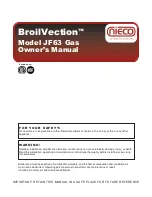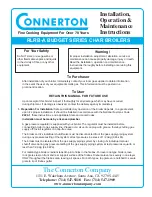
50
LP- 276 REV. 9.4.14
PART 8 – START-UP PREPARATION
A. CHECK / CONTROL WATER CHEMISTRY
It is recommended that you test your water quality prior to installation. Listed below are some guidelines.
Do not use petroleum-based cleaning or sealing compounds in the boiler system. Damage to elastomer seals and gaskets in the
system could occur, resulting in substantial property damage.
Chemical imbalance of your water can cause severe damage to your water heater and associated equipment, and may also affect
efficiency. You may have to have your water quality professionally analyzed to determine whether you need to install a water softener.
It is important that the water chemistry on both the domestic hot water and central heating sides are checked before installing the
heater, as water quality will affect the reliability of the system. Outlined below are those water quality parameters which need to be met
in order for the system to operate efficiently for many years.
Failure of a heat exchanger due to lime scale build-up on the heating
surface, low pH or other imbalance IS NOT covered by the warranty.
Water Hardness
Water hardness is mainly due to the presence of calcium and magnesium salts dissolved in the water. The concentration of these salts
is expressed in mg/L, ppm or grains per gallon, as a measure of relative hardness of water. Grains per gallon is the common reference
measurement used in the U.S. water heater industry. Hardness expressed as mg/L or ppm may be divided by 17.1 to convert to grains
per gallon. Water may be classified as very soft, slightly hard, moderately hard, or hard based on its hardness number. The minerals in
the water precipitate out when the water is heated and cause accelerated lime and scale accumulation on a heat transfer surface.
If the hardness of the water exceeds the maximum level of 7 grains per gallon, water should be softened to a hardness level no lower
than 5 grains per gallon. Water softened as low as 0 to 1 grain per gallon may be under-saturated with respect to calcium carbonate,
resulting in water that is aggressive and corrosive.
Consult local water treatment companies for unusually hard water areas (above 7 grains hardness).
pH of Water
pH is a measure of relative acidity, neutrality or alkalinity. Dissolved minerals and gases affect water pH. The pH scale ranges from 0 to
14. Water with a pH of 7.0 is considered neutral. Water with a pH lower than 7 is considered acidic. Water pH higher than 7 is
considered alkaline. A neutral pH (around 7) is desirable for most potable water applications.
Corrosion damage and heater failures
resulting from water pH levels of lower than 6 or higher than 8 ARE NOT covered by the warranty.
The ideal pH range for water
used in a storage tank or a water heater system is 7.2 to 7.8.
1. Maintain boiler water pH between 6.0 and 8.0. Check with litmus paper or have it chemically analyzed by a water treatment
company.
2. If the pH differs from above, consult local water treatment company for treatment needed.
Total Dissolved Solids
Total Dissolved Solids (TDS) is a measurement of all minerals and solids dissolved in a water sample. The concentration of total
dissolved solids is usually expressed in parts per million (ppm).
Water with a high TDS concentration will greatly accelerate lime and scale formation in the hot water system. Most high TDS
concentrations precipitate out of the water when heated. This can generate a scale accumulation on the heat transfer surface that will
greatly reduce the service life of a water heater. This scale accumulation can also impede the ability of the heat exchanger to transfer
heat into the water. A heat exchanger damaged or blocked by lime/scale accumulation must be replaced.
The manufacturer of the water heater has no control of water quality, especially TDS levels in your system. Total dissolved solids in
excess of 2,000 ppm will accelerate lime and scale formation in the heat exchanger. Heat exchanger failure due to total dissolved solids
in excess of 2,000 ppm is a non-warrantable condition.
Failure of a water heater due to lime scale build up on the heating surface
IS NOT covered by the warranty.
1. Do not connect the boiler to directly heat a swimming pool or spa water.
2. Do not fill boiler or operate with water containing chlorine in excess of 100 ppm.
Hardness:
7 grains
Chloride levels:
100 ppm
pH levels:
6-8
TDS:
2000 ppm
Содержание Mod Con 300 VWH
Страница 12: ...12 LP 276 REV 9 4 14 Figure 2 Dimensions and Specifications ...
Страница 22: ...22 LP 276 REV 9 4 14 I PIPING DIAGRAMS Figure 6 ...
Страница 49: ...49 LP 276 REV 9 4 14 Figure 28 Mod Con Internal Connection Diagram LP 255 ...
Страница 63: ...63 LP 276 REV 9 4 14 Figure 31 ...
Страница 64: ...64 LP 276 REV 9 4 14 Figure 32 ...
Страница 65: ...65 LP 276 REV 9 4 14 Figure 33 NOTE Ceramic Refractory Part 7250P 162 ...
Страница 66: ...66 LP 276 REV 9 4 14 Figure 34 ...
Страница 67: ...67 LP 276 REV 9 4 14 Figure 35 ...
Страница 70: ...70 LP 276 REV 9 4 14 ...
Страница 71: ...71 LP 276 REV 9 4 14 ...
Страница 72: ...72 LP 276 REV 9 4 14 MAINTENANCE NOTES ...
















































